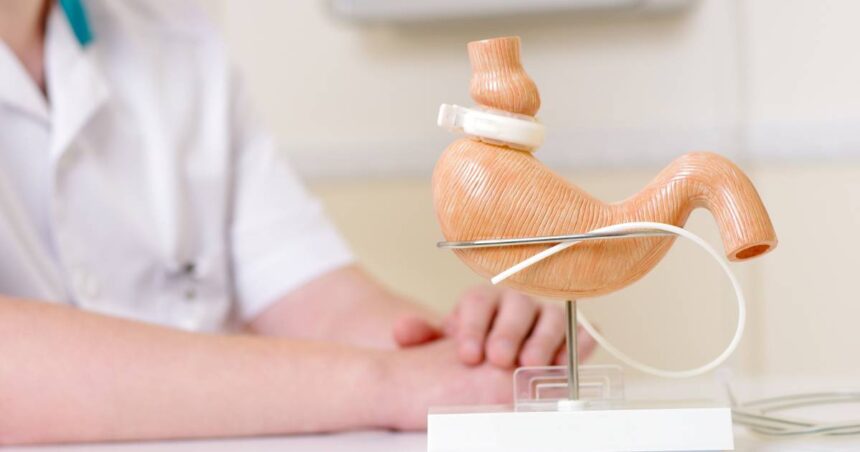Gastric bypass procedures are a sort of surgical procedure typically advisable for individuals who must lose a major quantity of weight for well being causes.
A health care provider might advocate gastric bypass surgical procedure for folks with diabetes to assist stop coronary heart illness, decrease hypertension, help with weight reduction, and in some circumstances, reverse kind 2 diabetes.
This text will examine gastric bypass and different weight-loss surgical procedures and the way these procedures can profit folks residing with diabetes.
What’s gastric bypass surgical procedure?
Gastric bypass is a standard sort of weight-loss surgical procedure, also called bariatric surgical procedure. A gastric bypass process entails restructuring the abdomen and small intestines in order that meals passes by the digestive system otherwise.
The surgical procedure causes meals to “bypass” the abdomen and as an alternative go to the intestines.
There are a number of results of this redirection in meals and restructuring of the digestive system.
First, as a result of the bigger abdomen isn’t used as a primary cease for meals, most individuals discover that they really feel full sooner after a gastric bypass process. This implies an individual can not eat as a lot meals after the process, and most of the people report feeling full for longer after a meal.
Second, as a result of eaten meals additionally bypasses a portion of the digestive system that absorbs vitamins, fewer energy are absorbed, which additional helps within the weight reduction course of.
This additionally implies that fewer micro-nutrients are absorbed, so individuals who endure gastric bypass surgical procedures are usually prescribed a routine of each day nutritional vitamins to complement what’s now not absorbed by weight-reduction plan alone.
The most typical sort of gastric bypass surgical procedure is the Roux-en-Y process (named after the surgeon who invented it, César Roux), and the way in which the abdomen and small gut are linked into a brand new “Y” form.
In keeping with the College of California, Los Angeles Faculty of Medication, gastric bypass surgical procedures have good short-term and long-term weight reduction outcomes.
Within the short-term, most sufferers can count on to lose 60% – 80% of their extra weight. Trying to the long run, most sufferers hold off not less than half of the surplus weight.
Gastric bypass surgical procedures are also usually efficient at serving to folks to keep away from issues related to being chubby or overweight for a sustained time frame.
These procedures usually are not for everybody. Gastric bypass is often solely advisable by a health care provider if an individual’s physique mass index (BMI) is 40 or larger, or if they’ve a BMI over 35 occurring similtaneously sure severe weight-related diagnoses.
Can an individual with diabetes have gastric bypass surgical procedure?
Sure, folks with diabetes can have gastric bypass surgical procedure when it’s advisable by a health care provider or different medical supplier.
Typically talking, gastric bypass surgical procedure is simply advisable for adults with kind 2 diabetes once they have a BMI over 35, and when weight can’t be managed by weight-reduction plan, train, and medicine alone.
There are additionally some circumstances when gastric bypass surgical procedure might be advisable even when an individual’s weight or BMI alone wouldn’t usually meet the everyday medical commonplace. These can embrace if an individual’s blood sugars (as measured by HbA1c) are considerably out of vary and are tough or unimaginable to regulate by remedy, weight-reduction plan, and train.
If an individual is having main issues from kind 2 diabetes and a medical skilled assesses that vital weight reduction is important, gastric bypass might also be the popular medical intervention.
In keeping with the American Academy of Pediatrics, there are additionally some restricted circumstances when youngsters over the age of 13 with medical weight problems and situations like kind 2 diabetes might profit from weight reduction surgical procedures like gastric bypass.
How does gastric bypass surgical procedure have an effect on diabetes?
The principle function of gastric bypass surgical procedure is to assist folks drop some pounds and keep away from issues that come about from extended intervals of being chubby or overweight.
Medical research have lengthy established that as physique fats and BMI improve, insulin resistance additionally will increase.
As a result of gastric bypass surgical procedures assist most individuals to quickly drop some pounds, the insulin resistance that’s the hallmark of kind 2 diabetes is mostly improved by the process.
Moreover, in keeping with analysis printed within the Journal of Medical Endocrinology & Metabolism, practically 60% of adults with kind 2 diabetes who underwent a gastric bypass process skilled long-term remission.
After gastric bypass and weight reduction, fewer folks wanted to take long-acting or mealtime insulin, and roughly half of the individuals who beforehand had kind 2 diabetes will obtain regular, “non-diabetic” blood sugars as measured by an A1c.
Whereas full weight reduction from the process can take 12 – 24 months, the impacts on blood sugars might be a lot faster.
A major proportion of individuals with kind 2 diabetes will expertise near-normal blood sugar ranges inside days after a gastric bypass process, though that is seemingly partially due to the calorie-restricted weight-reduction plan required in the course of the post-operative restoration interval.
What are the dangers of bariatric surgical procedure for diabetes?
Whereas gastric bypass itself is without doubt one of the most secure surgical procedures and has good potential to assist folks drop some pounds, all bariatric surgical procedures do include some dangers.
Among the potential issues of weight-loss surgical procedures embrace:
- Extended nausea and vomiting
- Acid reflux disease (heartburn) and gastroesophageal reflux illness (GERD)
- Publish-surgical infections
- Malnutrition
- Obstruction of the abdomen or intestines
- Incapability to eat sure meals
There are different modifications folks with diabetes specifically ought to concentrate on in the event that they endure gastric bypass surgical procedure.
One complication to pay attention to is an elevated threat of hypoglycemia or low blood sugar.
As a result of the abdomen is functionally smaller after gastric bypass, people who find themselves taking insulin ought to be cautious round low blood sugars. When experiencing low blood sugar after the process, some folks with diabetes have reported it’s harder to eat sufficient carbs/sugar to rapidly carry blood sugar again as much as a traditional stage.
As a result of gastric bypass and different bariatric procedures also can trigger nausea and vomiting, it’s vital for individuals who use insulin to pay attention to their blood sugar ranges and keep away from dosing an excessive amount of in case it’s tough to complete a meal or hold meals down.
That is particularly vital quickly after the process whereas getting used to how a lot meals it takes to really feel full and the way the physique reacts to consuming.
A really small proportion of individuals additionally expertise repeated, severe low blood sugars as a facet impact of gastric bypass surgical procedure.
For most individuals for who a health care provider recommends gastric bypass, the dangers of issues are comparatively small in comparison with the dangers of being considerably chubby for a protracted time frame.
Earlier than present process gastric bypass surgical procedure, it’s vital to speak along with your physician and medical care workforce about find out how to handle your diabetes earlier than and after the process, and if there are particular modifications to remedy, weight-reduction plan, or train that will likely be wanted to make the process profitable and scale back the danger of issues.
What’s the greatest weight-loss surgical procedure for diabetes?
There are lots of totally different sorts of weight-loss surgical procedures. In the USA and Europe, the three commonest sorts of weight-loss surgical procedure are gastric bypass, adjustable gastric banding (additionally known as a “lap-band”), and sleeve gastrectomy procedures.
There are advantages and disadvantages to every kind of surgical procedure, and a health care provider might advocate one over one other for a variety of medical causes.
Medical trials have persistently discovered gastric bypass to be protected, well-tolerated, and efficient at serving to folks with kind 2 diabetes to lose extra weight and keep away from issues.
For that reason, gastric bypass surgical procedure is the commonest bariatric process advisable for folks with kind 2 diabetes.
Latest analysis has additionally indicated that one other, less-common surgical process, often known as biliopancreatic diversion, could possibly be much more efficient for some folks with diabetes. It’s because the biliopancreatic diversion process helps folks change into extra insulin delicate than different weight-loss surgical procedures.
Nevertheless, gastric bypass surgical procedure has fewer potential issues, has a protracted historical past, and has a very good security profile. Due to this, most medical professionals will advocate gastric bypass for folks with diabetes who want surgical procedure to assist them drop some pounds and enhance management of their diabetes.
Your physician or medical supplier can talk about all of the surgical and non-surgical choices out there and can be capable to clarify why they advise a particular plan of action.
Regularly requested questions
There are 4 main sorts of gastric bypass surgical procedure. Gastric bypass, Roux-en-Y (RYGB, proximal) is the commonest. There are additionally Roux-en-Y distal procedures, plus the mini gastric bypass and the endoscopic duodenal-jejunal bypass, that are nonetheless being evaluated by medical trials.
Nearly 60% of adults with kind 2 diabetes who underwent gastric bypass surgical procedure skilled long-term remission of their diabetes.
Metformin should be prescribed after a gastric bypass, however research have proven that its absorption and effectiveness could also be altered, so it’s seemingly that your physician will regulate your dosage.












